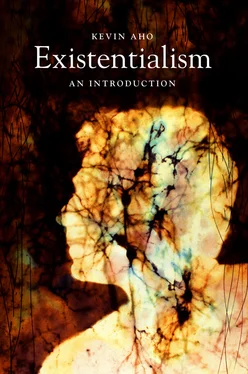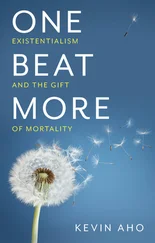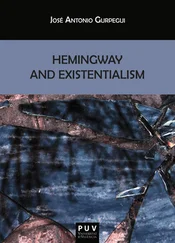Kevin Aho - Existentialism - An Introduction
Здесь есть возможность читать онлайн «Kevin Aho - Existentialism - An Introduction» весь текст электронной книги совершенно бесплатно (целиком полную версию без сокращений). В некоторых случаях можно слушать аудио, скачать через торрент в формате fb2 и присутствует краткое содержание. Год выпуска: 2013, ISBN: 2013, Издательство: Polity, Жанр: Философия, на английском языке. Описание произведения, (предисловие) а так же отзывы посетителей доступны на портале библиотеки ЛибКат.
- Название:Existentialism: An Introduction
- Автор:
- Издательство:Polity
- Жанр:
- Год:2013
- ISBN:978-0745651422
- Рейтинг книги:3 / 5. Голосов: 1
-
Избранное:Добавить в избранное
- Отзывы:
-
Ваша оценка:
- 60
- 1
- 2
- 3
- 4
- 5
Existentialism: An Introduction: краткое содержание, описание и аннотация
Предлагаем к чтению аннотацию, описание, краткое содержание или предисловие (зависит от того, что написал сам автор книги «Existentialism: An Introduction»). Если вы не нашли необходимую информацию о книге — напишите в комментариях, мы постараемся отыскать её.
Existentialism: An Introduction
Existentialism: An Introduction — читать онлайн бесплатно полную книгу (весь текст) целиком
Ниже представлен текст книги, разбитый по страницам. Система сохранения места последней прочитанной страницы, позволяет с удобством читать онлайн бесплатно книгу «Existentialism: An Introduction», без необходимости каждый раз заново искать на чём Вы остановились. Поставьте закладку, и сможете в любой момент перейти на страницу, на которой закончили чтение.
Интервал:
Закладка:
Finally, existentialism made a deep and lasting impression on psychiatry and the developing practice of psychotherapy by challenging the reductive and mechanistic approach of Freudian analysis and biochemical accounts of psychopathology. Heidegger, Sartre, Merleau-Ponty, and Jaspers all offered critiques of the psychiatric assumption that the human being could be treated as an ‘object’ of scientific investigation. Instead, they argued that the human being could only be understood within a particular social context that provides a background sense of what matters in life. In their view, it is only by being bound up in the world that we can make sense of who we are as persons, and when our sense of belongingness or integration with the world breaks down, psychiatric conditions begin to emerge. The only way for a psychiatrist to properly understand a patient, then, is to try to access, however incompletely, their way of ‘being-in-the-world.’ As Scottish psychiatrist R. D. Laing (1927–1989) explains: “One has to be able to orientate as a person in the other's scheme of things rather than only to see the other as an object in one's own world” (1960, 26). The existentialist view inspired a diverse group of prominent European and American psychiatrists, including Ludwig Binswanger (1881–1996), Medard Boss (1903–1990), Rollo May (1909–1994), Viktor Frankl (1905–1997), and Irvin Yalom (b. 1931). And it allowed clinicians to reenvision the meaning of psychic suffering. Rather than regarding anxiety and depression in terms of medical pathologies, existential therapists interpreted them as ‘givens,’ as constitutive of the human situation. The aim of therapy, in their view, is not to blunt these feelings through pharmacological intervention or to overcome them by gaining insight into their Oedipal sources, but to have the patient accept and integrate them into his or her life as disclosive of their essential frailty, vulnerability, and impermanence. By facing and owning up to their predicament in this way, the patient can be freed from everyday forms of self-deception and live a deeper and more fulfilling life.
Before concluding this discussion, it is important to say a few words about the institutional reception of existentialism in the United States. Needless to say, American philosophers did not enthusiastically embrace the movement. At worst, it was regarded as a dangerous incarnation of ‘irrationalism’ or ‘nihilism’ that glorified individual freedom as the ultimate value without any recognition of our moral obligation to others. In terms of methodology, it was criticized for its impenetrable rhetoric and for failing to meet the standards of argumentative rigor and conceptual clarity that typified the methods of so-called ‘analytic philosophy’ and the dominant trends of empiricist, logical positivist, and ordinary language philosophy. Given this hostile reception, existentialism was still able to make gradual inroads into the philosophical mainstream. The academic initiation officially began in the 1930s when Jewish émigré scholars who had studied with Heidegger at Freiburg fled to the United States seeking asylum from Nazism. Among these figures, dubbed ‘Heidegger's Children,’ were Hannah Arendt (1906–1975), Herbert Marcuse (1898–1979), Hans Jonas (1903–1993), and Karl Löwith (1897–1973). With the exception of Marcuse, all of them found a home at one time at the University in Exile, founded in 1933 as a graduate division of the New School for Social Research in New York City (Wolin 2001). Outside of the small leftist enclave of the New School and a handful of Catholic universities, existentialism began to play a more prominent role in academe in the 1950s when John Wild (1902–1972), at the time a professor at Harvard, decided to create a new professional society for interested students and colleagues that focused on recent trends in French and German philosophy. Wild moved from Harvard to become chair of the philosophy department at Northwestern University in 1961, and his plan came to fruition the following year when the university hosted the inaugural meeting of the Society for Phenomenology and Existential Philosophy (or SPEP), now the second largest philosophical society in the United States.
In addition to the institutional development of SPEP and the founding of prominent journals like Philosophy and Phenomenological Research in 1939 and Man and World (now Continental Philosophy Review ) in 1968, a number of important works were published that introduced the movement and its major figures to an American audience. In 1949, Helmut Kuhn (1899–1991) published Encounter with Nothingness: An Essay on Existentialism offering one of the first comprehensive overviews of existentialist thinkers. Nietzsche scholar and translator Walter Kauffman (1921–1980) edited the anthology Existentialism from Dostoevsky to Sartre in 1956 that brought together primary texts from major figures, many of which had never been translated before. And in 1958, William Barrett (1913–1992) published Irrational Man: A Study in Existential Philosophy that has long been regarded as the definitive introduction to existentialism and widely praised for its historical scope, accessibility, and clarity. Meanwhile, a number of prominent American philosophers brought existentialist thought into conversation with core issues in Anglophone philosophy. Arthur Danto's (b. 1924) Nietzsche as Philosopher (1965) explored the relevance of Nietzsche's thought in relation to traditional problems in epistemology, philosophy of mind, and ethics. In 1972, Hubert Dreyfus (b. 1929), a former student of Wild's at Harvard, drew on the work of Heidegger and Merleau-Ponty to offer a pioneering critique of representational theories of knowledge and the scientific pretensions of Artificial Intelligence in his book What Computers Can't Do . (Dreyfus went on to train a whole generation of influential Heidegger scholars over a forty-year teaching career at the University of California, Berkeley.) And in his groundbreaking 1979 work Philosophy and the Mirror of Nature , Richard Rorty (1931–2007) appropriated the insights of existentialist thought to develop his own conception of ‘edifying philosophy’ to critically dismantle a number of assumptions that were fundamental to mainstream philosophy of mind and epistemology.
Although it was originally ghettoized, these historical developments all contributed to existentialism's legitimation and eventual acceptance as an important area of specialization in American philosophy. Today, it is strongly represented at the annual meetings of the American Philosophical Association (APA) with smaller professional research groups (or ‘Circles’) devoted to every major figure; there is scholarship published in prominent journals and book series devoted solely to existentialist thought at leading university presses; and it remains a steady presence in philosophy curricula at research and teaching institutions across the country. To be sure, traditional methodologies that emphasize logical rigor and argumentative clarity still dominate in the United States, but American philosophers have increasingly grown to appreciate William Barrett's pointed observation that “so far as he logicizes, man tends to forget existence. It happens, however, that he must first exist in order to logicize” (1958, 305).
From these reflections, we can begin to appreciate the enormous cultural impact that existentialism has had on the contemporary Western world in diverse areas of philosophy, literature, art, theology, and medicine. For this reason, it cannot be dismissed as a moribund, decade-long episode in postwar France. Rather, it represents a centuries-long engagement with the most fundamental of human questions: ‘ Who am I ?’ and ‘ How should I live ?’ These questions reverberate more powerfully than ever today as we struggle to find meaning and purpose in a secular world that is increasingly alienating, disjointed, and insecure. In order to address these questions, we have to first turn to the methodological issue of how to gain access to human existence. On the existentialist view, we cannot take the traditional standpoint of theoretical detachment and objectivity because, insofar as we exist, we are already caught up in the concrete situation that we find ourselves in. This means that existence can be accessed only from ‘inside,’ that is, from within one's own situated, affective, and embodied point of view. In chapter 2, we turn our attention to the various incarnations of what can be called the ‘insider's perspective’ as they are expressed in the works of Kierkegaard and Nietzsche, as well as in the phenomenological projects of Heidegger, Merleau-Ponty, and Sartre.
Читать дальшеИнтервал:
Закладка:
Похожие книги на «Existentialism: An Introduction»
Представляем Вашему вниманию похожие книги на «Existentialism: An Introduction» списком для выбора. Мы отобрали схожую по названию и смыслу литературу в надежде предоставить читателям больше вариантов отыскать новые, интересные, ещё непрочитанные произведения.
Обсуждение, отзывы о книге «Existentialism: An Introduction» и просто собственные мнения читателей. Оставьте ваши комментарии, напишите, что Вы думаете о произведении, его смысле или главных героях. Укажите что конкретно понравилось, а что нет, и почему Вы так считаете.












